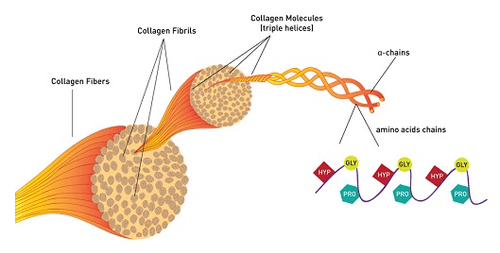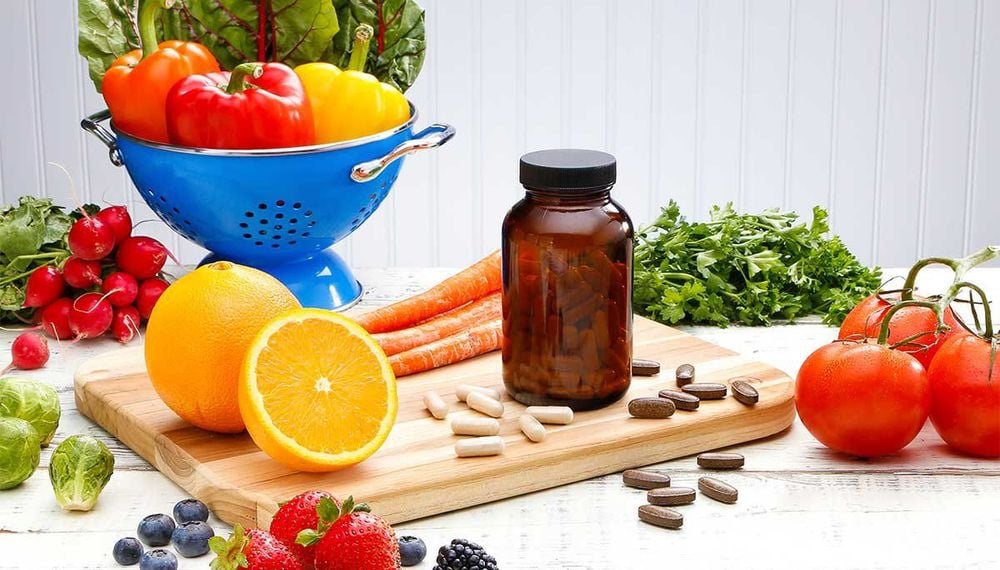Collagen is supplied to the body through the use of collagen-rich foods or functional food supplements. However, no matter how it is supplemented, collagen brings certain effects and has very few side effects.
1. What is collagen?
Collagen contains about 1/3 of the amount of protein, considered the compound containing the most protein in the body. It has the function of building blocks of bones, skin, muscles, tendons and ligaments. Other organs such as blood vessels, corneas and teeth also have collagen.
You can imagine collagen as a glue, keeping all the cell tissues stuck together. In Greek, collagen is called kólla, meaning glue.

Collagen holds all the tissues together.
2. What types of collagen are there?
There are at least 16 types of collagen, including 4 main types: types I, II, III and IV, including:
- Type I: Type I accounts for 90% of the collagen in the body and is made up of dense fibers. It contributes to the structure of skin, bones, tendons, fibrocartilage, connective tissue and teeth.
- Type II: Type II is made up of looser fibers and is found in elastic cartilage, joint cushions.
- Type III: Type III supports the structure of muscle mass, organs and arteries.
- Type IV: Type IV supports purification and is found in the layers of the skin.
As we age, the amount of collagen produced decreases and the quality also decreases. The signs that you can easily recognize are that the skin becomes less firm and wrinkled, and the cartilage also weakens over time.
3. Supplement collagen through functional foods
3.1 How to supplement collagen
Collagen peptide powder is easily supplemented when combined with foods. Non-gel peptide form, you should mix it into smoothies, soups or baked goods, this does not affect the absorption level. You can also use gelatin to make jello or gummies. In addition, collagen produced from fish skin is also a high-quality source of collagen to provide.
3.2 What are the effects of drinking collagen?
The benefits of collagen have been scientifically proven through:
- Muscle mass: A 2019 study showed that combining collagen peptide supplements and strength training increased muscle mass more than a placebo.
- Arthritis: A 2017 study on mice showed that collagen supplementation helped osteoarthritis in mice recover faster.
- Skin elasticity: In a 2019 study, women taking collagen supplements showed improvements in skin appearance and elasticity. Collagen is also used in topical treatments to improve skin quality by minimizing fine lines and wrinkles.
Another study also found that collagen supplements are effective in treating leaky gut syndrome.

Drinking collagen increases skin elasticity
3.3 Is collagen good to drink?
So far, collagen supplements are considered relatively safe. Some side effects have been reported related to unpleasant taste, feeling of fullness in the stomach and heartburn. In addition, you may also be allergic to the ingredients in collagen supplements.
4. Supplementing natural collagen through foods
4.1 Collagen supplements
Collagen is stored in the form of procollagen precursor. It is created by combining two amino acids, glycine and proline, under the effect of vitamin C. Therefore, if you are wondering what to eat to increase collagen production, the following foods are a suggestion:
- Vitamin C: Found in many citrus fruits, bell peppers and strawberries.
- Proline: Large amounts of proline are found in egg whites, wheat germ, dairy products, cabbage, asparagus and mushrooms.
- Glycine: Found in pork skin, chicken skin, bone broth, and some protein -rich foods.
- Copper: Found in organ meats, sesame seeds, cocoa powder, cashews, and lentils.
In addition, the body also needs to be supplemented with foods containing high-quality protein such as meat, poultry, seafood, milk, beans, and tofu.

Citrus fruits contain lots of vitamin C which supplements collagen.
4.2 Foods that destroy collagen
Foods that contain the following nutrients have been shown to destroy collagen:
- Sugar and refined carbs: They limit collagen’s ability to repair itself, so you should minimize your intake.
- Too much sun: Limit your exposure to sunlight as UV rays can reduce collagen production.
- Smoking: Smoking reduces collagen production, which also reduces wound healing and leads to wrinkles.
In addition, some autoimmune diseases such as lupus can also cause collagen destruction.

Sun exposure reduces collagen production.
5. Other uses of collagen
In addition to the above effects, collagen is also used in many areas of life, typically:
- In life, collagen is used to create strings for musical instruments
- In food, collagen is heated to create gelatin, used as sausage casings.
In medicine, collagen is used as a skin smoothing agent in cosmetic surgery, replacing lost skin in severe burns.
Collagen is a nutrient that helps build many important organs in the body. You can supplement collagen in many different ways with few side effects.





